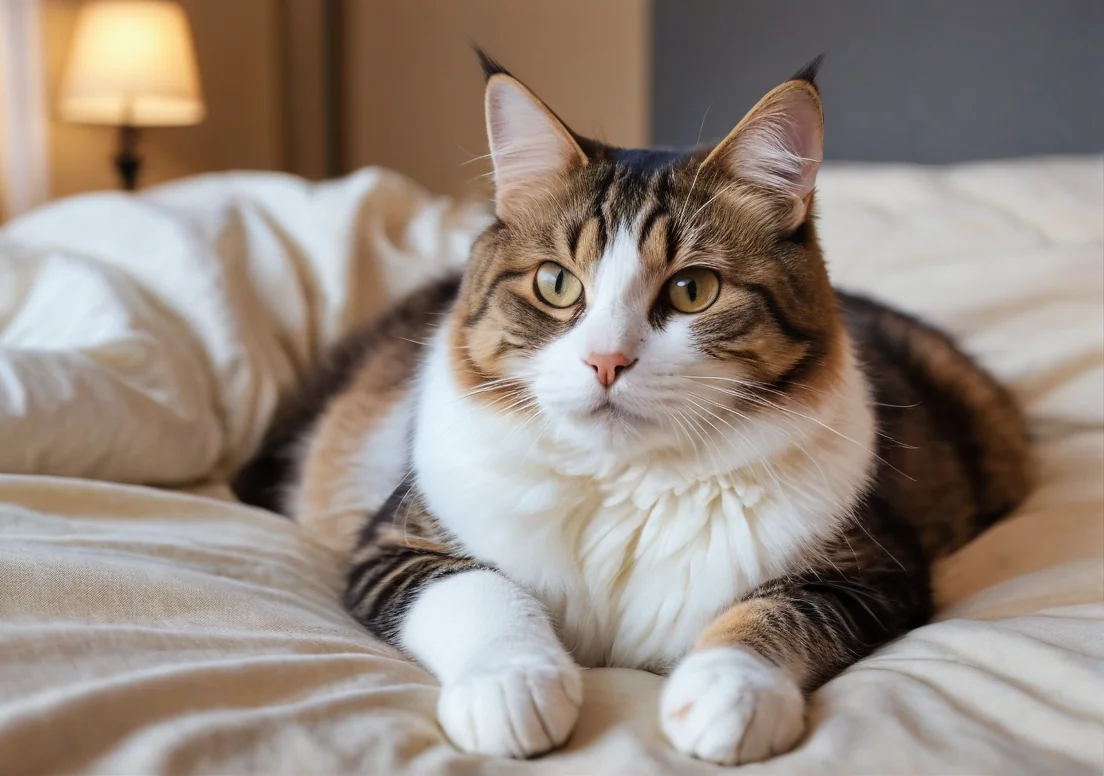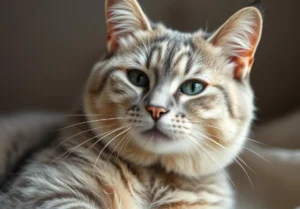Cats can be mysterious creatures, often leaving us bewildered by their puzzling behaviors. One minute they’re purring on your lap, and the next, they’re leaving uninvited surprises on your bed.
A cat might poop on the bed for several reasons, including stress, territorial marking, or a health issue. It’s crucial to address these behaviors quickly as they can indicate underlying concerns. Curious about what drives this behavior further? There’s more to discover about your feline friend’s habits below!

What drives your cat’s decision-making?
Cats are creatures of habit, but their behaviors can often spring surprises. A cat’s decision-making is influenced by a variety of factors. One major aspect is their environment. Things like changes in furniture arrangement, new pets, or the introduction of unfamiliar scents can shift their comfort levels.
Their mood also plays a significant role. Just like us, cats experience good and bad days. An anxious or curious cat may explore boundaries, leading to unexpected places for its business. Sometimes, this can stem from positive experiences—like feeling safe and cozy where you sleep. It’s interesting how a bed, a place of comfort for us, can also seem like an ideal spot for a feline to leave a present.
Additionally, their health can’t be overlooked. If a cat has a medical issue—like a urinary tract infection—it might feel more inclined to avoid the litter box. Understanding these layers helps clarify your cat’s quirky behaviors.
Is your cat experiencing stress?
Changes in routine or environment can be quite unsettling for your feline friend, often leading to stress that manifests in frustrating ways, like pooping outside the litter box. Cats thrive on consistency; a disrupted schedule or a new loud neighbor can be unnerving.
One specific trigger might be lifestyle changes. If you’ve moved, had a new baby, or changed your work hours, these can create anxiety. In some cases, even subtle things like rearranging furniture can throw a cat off balance. When faced with stress, cats might avoid their litter box entirely or even choose to go somewhere they perceive as safe—like your bed.
Here are a few signs your cat might be stressed and could be using your bed as a bathroom:
- Hiding or decreased social interaction: If your cat’s suddenly become a recluse, that’s a hint something’s off.
- Excessive grooming or scratching: These behaviors can indicate anxiety.
- Changes in eating: Eating less or more can also reflect underlying stress.
Understanding these stress signals is key. Addressing the cause—whether through creating a calm atmosphere or providing engaging distractions—can often lead to a happier, healthier cat and a cleaner home environment.
Could it be a medical issue?
If your cat’s decided that your bed is the ideal bathroom, it might not just be stubbornness or bad habits at play. Medical issues can significantly influence litter box behavior. Conditions like diabetes, urinary tract infections, or intestinal parasites may lead to inappropriate elimination. If your cat seems to be straining or showing discomfort when trying to poop, it’s crucial to consult a vet as soon as possible.
Keep an eye out for additional signs like changes in appetite, weight loss, or unusual drinking habits. These could indicate health problems that warrant immediate attention. Regular vet check-ups are key to spotting any underlying conditions early on, so don’t skip those appointments. A proactive approach can often prevent surprises down the line.
What about litter box aversion?
Litter box aversion is a surprisingly common reason for cats choosing alternative restroom spots, like your fresh bedsheets. First off, check the litter box condition. Cats are finicky creatures. If the litter box isn’t scooped daily or has a persistent odor, your cat may just refuse to use it altogether.
Accessibility also plays a role. If the box is tucked away in a noisy or hard-to-reach corner, your cat might feel stressed about using it. Make sure there are enough litter boxes around—ideally, one per cat plus one extra—to prevent accidents.
Additionally, consider the type of litter you’re using. Some cats dislike certain textures or scents. Experiment with different options to see what your furry friend prefers. Sometimes a small change can lead to a big difference!
Lastly, while you’re troubleshooting, remember that any sudden change in litter box behavior can be a sign of stress or frustration as well. Changes in the home environment—like a new pet or even a furniture rearrangement—can contribute. Creating a calm space for your cat might bring back their preferred potty habits.
Is territorial marking a factor?
Cats are instinctively territorial creatures, and sometimes pooping on the bed can be a way for them to establish their claim. If a cat feels threatened by another pet or perceives a change in its environment, it might use feces as a way to communicate its displeasure or insecurity. This behavior is rooted in their natural instincts—by leaving their mark in a prominent area, they send a message: “This is MY space.”
If you’ve recently introduced a new pet, changed furniture, or moved to a new home, these alterations can trigger territorial marking. Pay attention to your cat’s body language and behaviors; if it’s more anxious or aggressive, it might be reacting to perceived threats. To help, provide safe spaces for your cat, maintain a consistent environment, and consider using pheromone diffusers, which can help ease stress and reinforce a sense of belonging.
Are there behavioral triggers?
Several specific behaviors or events can lead to a cat pooping outside its litter box, especially on your bed. Key triggers to consider include:
Stressful events : Changes like moving, new family members (human or animal), or loud noises can upset a cat’s sense of security.
Litter box issues : An unclean litter box, not enough boxes (the rule is one more than the number of cats), or a box that’s too small can lead to litter box avoidance.
Medical problems : Conditions like urinary tract infections, gastrointestinal issues, or constipation can cause a cat to feel urgency. If this behavior is new, a vet visit may help rule out health issues.
Attention-seeking : Some cats may defecate outside the box to get attention, especially if they notice their actions lead to fuss and focus from their owners.
To address these triggers, spot-clean the litter box daily, ensure each cat has access to its own, and monitor your cat for signs of illness. It’s essential to stay mindful of their behavior and environment to help reduce stress and inappropriate elimination.
How to manage this behavior effectively?
Dealing with a cat that poops on the bed can be frustrating, but understanding the root cause helps in managing the behavior. This could stem from stress, anxiety, or even health issues. Here are some specific strategies to help shape better habits:
Litter Box Placement : Ensure the litter box is in a quiet, accessible spot. If it’s too close to their food or in a high-traffic area, they might avoid it.
Litter Type Preferences : Some cats are picky about litter. Experiment with different types (clumping, non-clumping, natural) to see what they prefer.
Regular Cleaning : Keep the litter box clean by scooping daily and replacing the litter regularly. Cats are clean creatures and may refuse to use a dirty box.
Stress Reduction : Identify potential stressors, like new pets, changes in routine, or loud noises. Consider using pheromone diffusers or calming sprays to create a more peaceful environment.
Routine Vet Check-ups : If the behavior persists, it’s wise to consult a vet. Medical issues like urinary tract infections or gastrointestinal problems can trigger inappropriate elimination.
Positive Reinforcement : Reward your cat for using the litter box with treats or affection. This helps to reinforce the desired behavior.
By addressing these factors, you create a more inviting atmosphere for your cat to feel comfortable eliminating in their designated area.
Trivia: Unusual feline facts
Cats are full of surprises, especially when it comes to their behavior and elimination habits. Here are a few quirky insights you might not know:
Territorial Marking : Cats have scent glands in their paws. Scratching and marking their territory can sometimes lead to misdirected potty habits.
Instinctual Behaviors : In the wild, cats often cover their waste to hide their presence from predators. This is why a clean litter box is crucial; they want what mimics nature.
Box Preference : Some cats prefer covered boxes, while others like them open. It’s often about comfort and taking a “safety” stance.
Choosing Locations : Cats may prefer soft surfaces for elimination due to instinctual behavior. This could explain why your bed seems like a prime option.
Multi-cat Dynamics : In a multi-cat household, competition over resources like litter boxes can lead to accidents. Aim for one box per cat plus one extra.
Understanding these unique behaviors helps pet owners empathize with their feline friends and find solutions to pesky problems.
Alex, a passionate animal lover, has experience in training and understanding animal behavior. As a proud pet parent to two dogs and three cats, he founded AnimalReport.net to share insights from animal experts and expand his knowledge of the animal kingdom.




